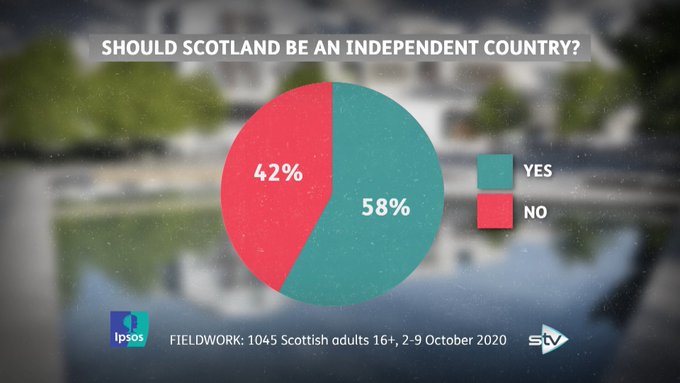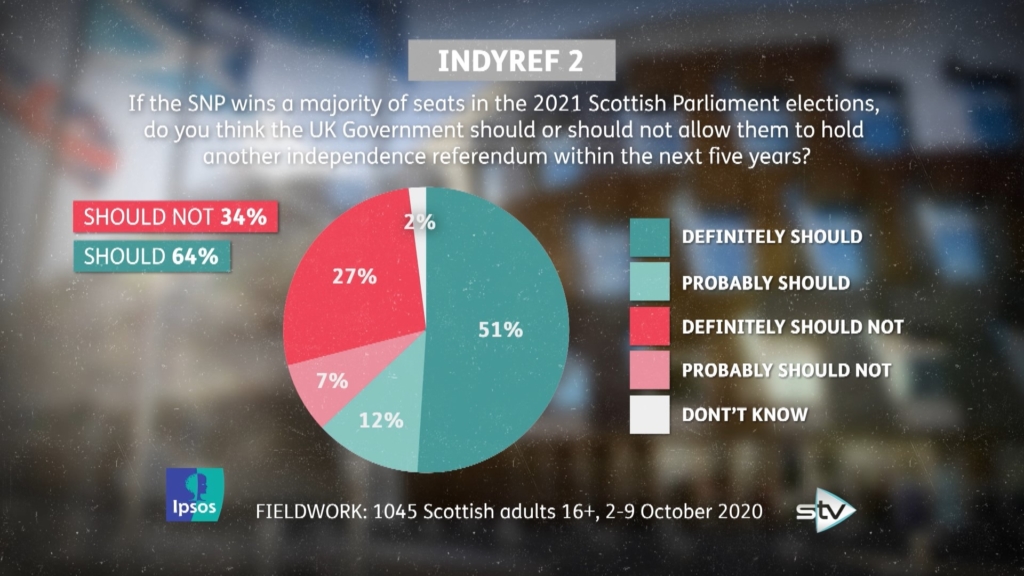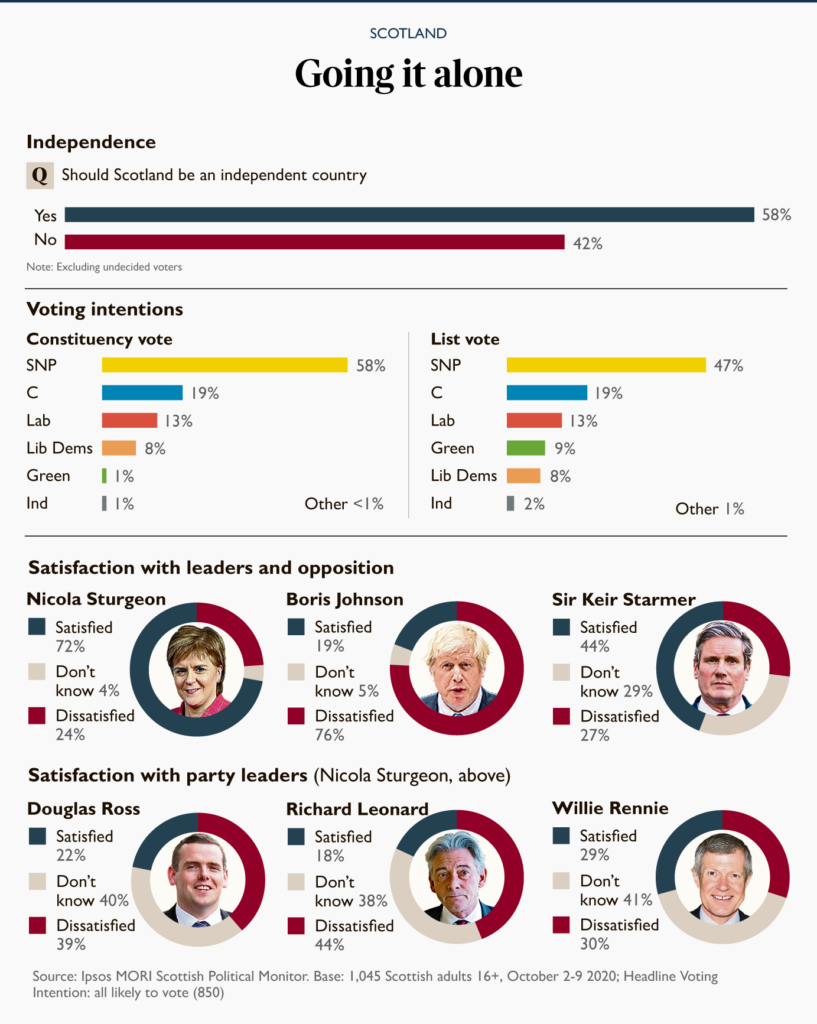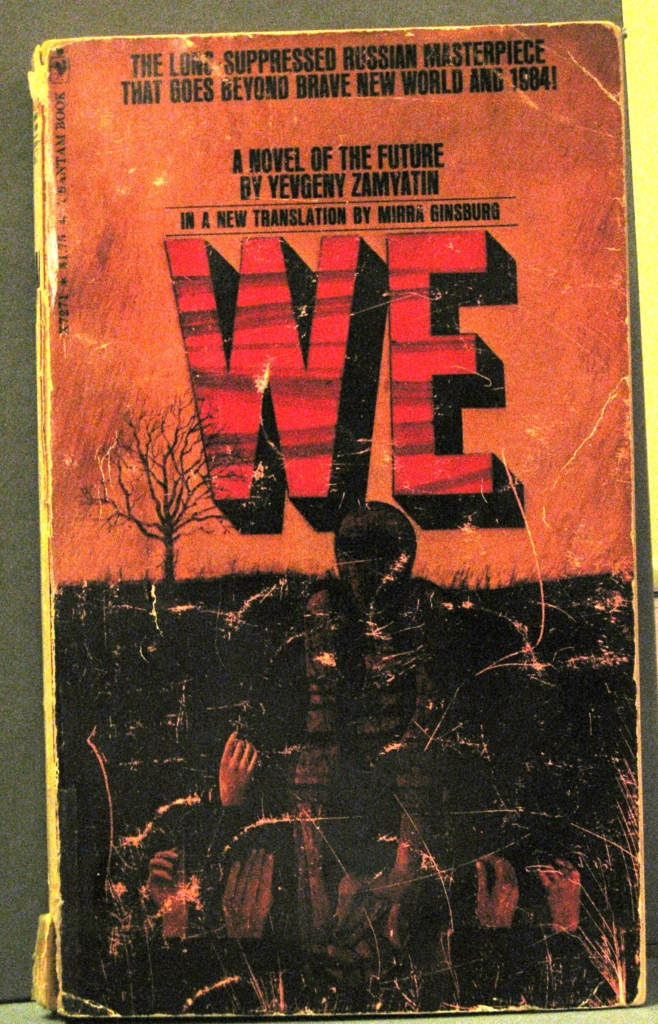Lost and Found
Whether it be at Derby (’45) or Cordoba (’78), Scotland has a knack of clutching failure from the jaws of victory and tilting irretrievably towards glorious failure. A cliche maybe, but one born formed from a history littered with such near-misses, terrible bad luck and unfortunate circumstances. Historically it’s been a safety-net, a comfort zone allowing us to ruminate in dark recrimination rather than step up and out into the light of responsibility and self-determination.
We’re past all that. Dire circumstances and a form of London rule that oscillates between Clown Car and Gangsterism are now pushing us on and up. This is the 10th poll in a row to show a majority for Yes in Scotland and now at the highest levels ever recorded.
Generationally the figures are stark: ‘Latest Scottish independence support polling by age: 16-24: 79% | 25-34: 68% | 35-44: 70% | 45-54: 55% | 55-64: 57% | 65+: 40% Source: Ipsos Mori, 2-9 October; but there’s something else at play, signs of a deeper collapse. Britain and Britishness is meaningless to anyone under 50 unless they are part of a very specific niche sub-culture. In the ignominy of the Brexit shambles it’s hard to see that being reversed ever. But we also see emerging a pan-Scotland consensus, as Ballot Box Scotland predicts a 77 pro-Independence versus 52 pro-Union Holyrood result based on ComRes polling – with 66 SNP and 11 Scottish Green Party MSPs predicted.
There’s a couple of other factors we see here. The first is the overwhelming consensus merging that the Holyrood election should be a litmus test for a second referendum. The second is the astonishing approval ratings for the First Minister recorded by Opinium: [Nicola Sturgeon (SNP): 49%, Douglas Ross (Cons): -17% , Richard Leonard (Lab): -25%, Willie Rennie (LibDem): -1%, Boris Johnson (Cons): -56%, Keri Starmer (Lab): 16%]. We also see that latest approval ratings show Nicola Sturgeon to be the highest approved leader in the UK [Sturgeon: +20% (+2) Starmer: +16% (-3) Davey: -8% (+1) Johnson: -12% (=) Farage: -25% (-3) Via @OpiniumResearch, 8-9 Oct. Changes w/ 23-25 Sep.] In what must be galling stat Sturgeon has a bigger positive rating among Labour voters than Richard Leonard does. She’s on + 43 and he’s on -18 with his OWN party voters. You could say that Richard Leonard’s political career as Scottish leader is over, but in truth it never really started.Finally the gender gap from 2014 has disappeared. The gender gap seen at the 2014 referendum, when women were less likely to support independence, had closed with 60 per cent of female voters now saying they would back “yes” compared with 57 per cent of men.
So geographically, across most generations, across genders and across parties the support for independence is growing.


For some people this is all intolerable and the cause of an almost existential crisis. The ongoing and historic success of pro-indy parties at Holyrood and the surge of support for independence is obviously a crisis for Unionist politicians and their scribes in the media, but paradoxically it also is the cause of great consternation for a small element of the nationalist movement who have now dedicated themselves to either/or destroying the SNP running an alternative party in the regional list. Three things simultaneously are the cause of much anger: the continued popularity of their bête noire, the First Minister, the ongoing support for the Scottish Green Party, and the fact that ‘Max the Yes’ as an electoral strategy is a busted flush. We are now in the extraordinary position of these most loyal of party servants writhing in agony at the very electoral success they once craved, every new poll in favour of Yes is a blow to the heart of their convoluted and bitter world view.


Outside of this group, response to the latest polls have varied. Kieran Andrews at The Times has reported that “Arts and charities to be wooed by UK government after poll puts support for independence among likely voters at 58 per cent” and that “Downing Street will ramp up its campaign to preserve the Union by wooing “Scottish civic society” after record support for independence emerged …No 10 is already nurturing business contacts but is now planning to cultivate closer ties with charities and organisations at the heart of Scottish arts and culture in an attempt to increase its visibility north of the border.”
Kenny Farquharson also of that parish seemed to be blinded to the Internal Market Bill, the power grab and the blatant surge of centralisation outlined by his colleague and instead foresaw an entirely different trajectory: “I hesitate to say the f-word, because it always brings a tsunami of incoherent rage from Yessers, but we are watching the foundations being laid for a federal Britain.”


If Farquharson might have been alone in witnessing the dawn of a new federal Britain, others were also wildly optimistic. Lewis Goodall, Policy Editor for Newsnight has written: “Britain is a multi-national state with competing political preferences. As I’ve written many times, that requires very careful calibration. Theresa May was clearly very cognisant of this and once you understood that, you understood why she did many of the things she did.”
Now this is a rose-tinted side-view of May’s regime. Sharp-eyed readers will remember the much over-looked speech May made in May 2017 in which she compared those who argue for self-determination for Scotland with ISIS. See here.
The idea that she was somehow some clear-sighted and nuanced politician on the constitution is fanciful.
But Goodall is right on other matters. He writes: “The best hope for the Union would probably be its reinvention, rehousing it in a new constitutional framework (federal parliament and so on). That would require proper imagination and verve from Westminster elites in a way not shown towards constitutional matters.”
The answers struck on by Goodall and Farquharson have been in plain sight for years, but it’s clear as day that they are not going to happen. The entire impulse and trajectory of the British State is towards centralisation. This is amplified when it is under threat and has been double-boosted by its experience of the 2014 referendum (Cameron’s immediate response being EVEL) and by the supreme hubris of Brexit.
It must be sobering for those Unionists clever enough to see what’s going on to realise that none of this was actually necessary at all.
But the misty-eyed trope of federalism is a well that must be running dry for the commentariat.
Britain 2020 and beyond looks much more like Yevgeny Zamyatin’s ‘OneState’ from the novel We than any fictional benevolent federation.
“Long live OneState! Long live the Numbers! Long live the Benefactor!”


Outsider Insider
Britain’s disintegration has not come quickly but it will now proceed with speed. The uniform response of Ed Davey, Willie Rennie, Richard Leonard and Boris ‘the Benefactor’ Johnson to repress democracy at all costs and in all situations is indefensible. The longer they hold that position the higher the political cost.
Much has changed since 2014. The insurgent Yes movement then was the outsider, the underdog and well behind in the polls. The movement was full of innocence and vision. Much of that has gone but it is replaced by battle-hardened troops and the energy of the newly-converted.
This movement – which has become a consensus – will now have to begin to speak for a whole country – and do so from an insider status not outsider status. That looks and feels very different. If Britain has been lost, Scotland must now be found. This may mean healing divisions and finding common cause, lest we snatch defeat from the jaws of victory once again. This time that would be a tragedy and a historic source of deep shame.

This is a welcome analysis, so thanks, Mike. I sometimes wonder if the rise in pro-Indy support (acknowledging the FM’s confident leadership, Brexit, Boris and the Power Grab) may not also be in part *because* we are not currently campaigning. Maybe campaigns *are* divisive. We are perhaps beginning to see a consensus across Scottish Society for Independence (a “settled will” to coin a phrase). Realistically 50% +1 is not nearly enough. The big implication then is that we should not be sweeping problems under the carpet to keep the electorate happy as we make one final push, but rather fostering the important dialogues that will have to be dealt with sooner or later. If our poll lead is not robust enough to withstand some controversy, then its certainly not strong enough to expect a stable society after Independence Day.
Have you noticed the Welsh dragon is swinging its tail…….? At last!
We can expect a whole pile-on from the “Scottish” media, Brit Nat politico’s, commentators and “experts”.
Promises, threats, lies, offers of circuses and cakes, not to mention “federalism”.
But nothing we haven’t had before.
There is a school of thought on the metro centric right, that Scotland needs to be put back in the box, Holyrood abolished or defenestrated.
I think that is the view of Johnson and Gove, and that is a BIG plus for independence.
Rule by London or an independent Scotland–no fake offers or fudge.
So, hold our nerve, ignore the shitstorm, and the future is ours!
Great work Mike, it really would be bad to see it snatched away . . . I haven’t seen any of these figures, Richard Leonard seems to be doing surprisingly well, and personally I have been working on Lab chums since 2014 😉 I have got at least one who is still Lab but now indy also . . . that is my sort of #duality but hey, I think independence is and always has been the goal, so either way.
From Orwell’s review of ‘We’: “It may well be, however, that Zamyatin did not intend the Soviet regime to be the special target of his satire. Writing at about the time of Lenin’s death, he cannot have had the Stalin dictatorship in mind, and conditions in Russia in 1923 were not such that anyone would revolt against them on the ground that life was becoming too safe and comfortable. What Zamyatin seems to be aiming at is not any particular country but the implied aims of industrial civilisation. I have not read any of his other books, but I learn from Gleb Struve that he had spent several years in England and had written some blistering satires on English life.”
Zamyatin was a marine engineer and spent time in Tyneside during WWI. Many of the features of We are drawn from his experience at that time. See also his earlier satire of English rigidity and conformity, The Islanders.
Mike, this is the sort of level-headed analysis I have come to expect of you. In a fluid COVID world, there’s maybe not so much that independence supporters can do prior to the elections in May next year. Assuming that is, that CumminsBorisGove allows us to have elections next year; it’s not impossible that they’ll find reason to cancel them, as they face the fact that the union is near-dead.
But if they ‘allow’ us to have elections, they and their media pals will certainly resurrect the ghost of federalism. Remember, federalism doesn’t have to be shown to actually WORK. All it needs to do now is persuade a few tens of thousand ditherers in Scots seats, to lose the election for the independence cause, and that’s all they want right now.
So, here’s how some time ago, I wrote down my fairly thought-out argument against federalism:
Some folk claim, despite political geography and history, that federalism remains the future of the UK. In times of political crisis, this delusion is aired by folks like the LibDems since … well, forever, Gordon Brown in 2014, and Richard Leonard MSP today.
A fatal flaw negates the possibility of UK federalism ever working.
Unless England is divided into several units, it can’t happen. England is most unlikely to be so divided, and won’t be before Scotland regains nationhood. A 2004 Government ballot in the North-east, with the strongest ‘regional identity’ in England, rejected an Assembly by 77.9% to 22.1% on a minority poll. The Blair Government abandoned the idea.
England has 84.3% of the UK population, Scotland 8.2%, Wales 4.7%, Northern Ireland 2.8%. (Wikipedia estimates based on 2011 Census figures.)
If Kernow ruled itself, and the Isles of Man, Jersey and Guernsey were to join a new federal UK, England would still be able to outvote every other component three times over. That applies, even in the impossible event that the Irish Republic’s nearly 5m people were to join a federal UK.
There are many federal states in the world. But not a single one in which one part can outvote all the others combined, several times over. Federalism can’t work here. Scotland will inevitably regain the independence voluntarily foregone to create the UK in 1707. Soon.
If a significant number of BC readers grasp the essential facts set out above, we can help destroy any credibility the f-word may have remaining to it in Scotland.
Except, given our awfie ability to grasp defeat from the jaws of victory, I’ll no be haudin ma breath…
Hi, Dougie Harrison!
I’m “replying” to you because if, since discovering myself one of the “45%” in 2014, I have retained my perspective of sanity(?), it’s been as a result of following “Bella” and appreciating, in particular, Mike Small’s excellent writing AND the well measured, additionally thought provoking comments his work generally inspires.
So…THANK-YOU for your argument against the “f-word” ever being any kind of alternative to Scotland’s Independence! I found it to be THE best, yet!
NOW I feel I can better blether to anyone & everyone on this subject….in these, the “end game” days for Independence, if we (the 58%-ish) aren’t 100% (at least!) prepared, in advance, to argue (politely) against every, imaginable (& quite likely, UNimaginable) pro-Union…”utterance”…ahead.
To get to my main point in replying to you, then….I would like to “reference” Mike Small’s “Lost & Found” article, specifically highlighting your “Comments”, in a wee, I hope, share worthy, “Facebook” post to my local “YES2 Hub” page. Please may I???? On the strength of “mony a mickle maks a muckle”, aye?
Sandra
Sandra, many thanks for your kind words. I agree with you re BC and Mike’s writing, and am glad you find the thoughts I expressed on the ‘f-word’ useful. Please use them in whatever way you think might most help advance independence.
My feelings about federalism are particularly heartfelt because I lived for a couple of years in Newcastle, and my former partner came from Co Durham. So I know the NE of England a great deal better than most folks from furth of it. And my thoughts on the ‘f-word’ have been well used recently; in last year’s general election I argued on many doorsteps with voters pre-disposed to support our local MP (I live in Milngavie), the then leader of the LibDems Jo Swinson. LibDems have been the most consistent supporters of federalism in the UK.
Our arguments prevailed, and the UK leader of the LibDems lost her seat in East Dunbartonshire, and was replaced by Amy Callaghan for the SNP. So the anti-f arguments I use have been tried and tested, and they CAN AND DO affect how folks vote.
BRILLIANT, Dougie! Thank-YOU!!! I sure will use your argument…as far & wide as possible! 🙂
Sandra
Great article – thanks. It “looks and feels very different” sums it up really well. It is time for key people in Scottish politics and media (in the SNP and elsewhere) to take a serious look at themselves in respect of what ‘healing divisions’ actually means. For example, humility, honesty and genuine dialogue rather than point scoring.
Mike, you rightly point out that it would be helpful to heal division and find common cause within the indy movement. But you say this having set up a divisive strawman characterisation of anyone who has concerns about the SNP leadership and the fundations on which the popularity for indy is growing. You conveniently frame these people as a “small group” and label them as angry.
It makes for a nice tidy story and I’m sure it is a satisfying swipe at people you feel personally hostile towards because they don’t always agree with you etc. But it is a dangerous device to use and is highly divisive. In reality, there are legitimate concerns about the SNP leadership and the fundations on which the new found support for indy are built that we should be able to discuss.
I think there are complex groups and factions within the party and the movement, that this piece doesn’t address. There are a great many legitimate concerns about SNP leadership and policy, many of which I have outlined and criticised here over years. People are entitled to agree or disagree with me over policy and strategy and I them.
I have valued you criticism of the SNP leadership over the years. I look forward to a more subtle and nuanced exploration of the movement and help with understanding people’s concerns about the current situation.
The paragraph above, that lumps together an undefined (and likely, undefinable) group of people as being angry about one or more very general issues, is unhelpful and potentially alienates your readership.
The Murrell 28 SNP Minister group sycophancy is being paid by every tax paying Scot earning over 27K per annum. What nuance is required to call that out for what it is; ie legalised corruption? Leader loyalty pays in the SNP.
When Mackay raised our taxes above the UK norm he wheeled out a range of tame childrens poverty groups in their justification. He lied. The charities were played. Our poverty levels are a blotting stain. Affordable Housing, oh please..on and on.
The SNP have mutated into a self serving near autocracy, [the return of the the zero lamented] Angus Robertson will suffice as an example.
They promote the rights of children to vote, but reel in horror at the thought of a sixteen year old on a ballot paper. Only one EU Nation out of 27 gives the vote to kids.
Shows confidence in the indie message eh?
Where the hell is the independence thinking, planning, programs, policies?….there are none. Zilch. Nada. Shouting ‘filthy toareez’ pays their intellectual bill. Nothing nuanced about it, the SNP are careerists who have settled nicely into the good life. Eg. Ms Forbes paying the regressive feudal Council Tax out of her taxpayer funded expenses should suffice. Nuanced?
Not in my world. Blatantly in your face ugly more like.
We need better and that realisation now slowly taking root is a start.
Mr Mince, you’ve misunderstood my comment and gone and got your tatties in a twist.
Michael,
I have decided to accept your gracious apology. No, but really you made me laugh. Admittedly I do have a tendency to heat up under the collar, particularly these days when I believe the SNP are taking the proverbial p*** out of the larger indie movement.
All the best.
I’m the gravy to your classic and delicious dish… WTF have the SNP leadership been doing since 2014! It is taking us off to a rebranded business as usual. And the rise in support for indy, not based on sound principles and increased awareness of the structural issues, but on the popularity of the current leader and being pissed off at not being able to travel to one’s holiday home in the south of France so easily, is deeply worrying!
Remember this Scotland still has an ever growing Empire, The Great Scottish Diaspora estimated at numbering up to 60M Scots born and generational. It is said in Canada that up to 40% of the population have some Scottish blood. We all have one thing in common we NEVER forget our origins and we would NEVER see Scotland suffer any damage to her wellbeing where we could contribute to prevent any such outcome. I am but one Scot but have worked out I could afford approx $ 4000 / annum if there were an electronic Scotland Fund established. It should be transparent to anybody and it’s allocation of dispersal likewise. The Scottish Government should establish such a fund as I believe more than Scots would contribute as we are trusted and respected wherever we have settled.